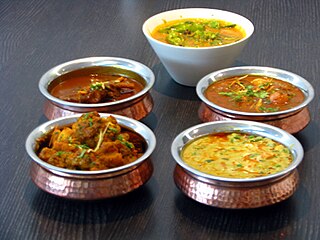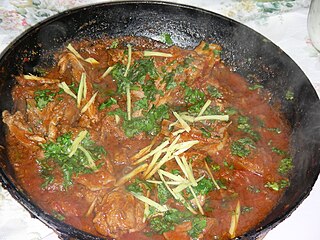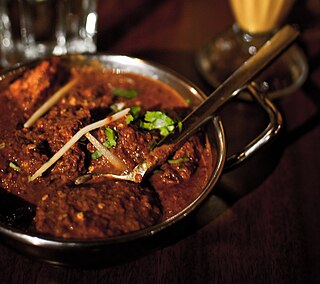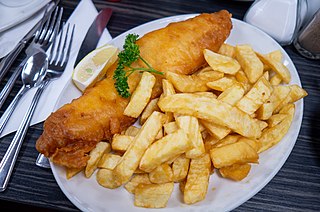
Curry is a dish with a sauce seasoned with spices, mainly associated with South Asian cuisine. In southern India, leaves from the curry tree may be included.

Chicken tikka masala is a dish consisting of roasted marinated chicken chunks in a spiced sauce. The sauce is usually creamy and orange-coloured. The dish was first offered by British cooks of south Asian origin and subsequently gained popularity at restaurants around the world.

A balti or bāltī gosht is a type of curry served in a thin, pressed-steel wok called a "balti bowl". The name may have come from the metal dish in which the curry is cooked, rather than from any specific ingredient or cooking technique. Balti curries are cooked quickly using vegetable oil rather than ghee, over high heat in the manner of a stir-fry, and any meat is used off the bone. This combination differs sharply from a traditional one-pot Indian curry which is simmered slowly all day. Balti sauce is based on garlic and onions, with turmeric and garam masala, among other spices.

Chicken tikka is a chicken dish popularised in the Indian subcontinent during the Mughal era. The dish is popular in India, Bangladesh, Pakistan and the United Kingdom. It is traditionally small pieces of boneless chicken baked using skewers on a brazier called angeethi or over charcoal after marinating in Indian spices and dahi (yogurt)—essentially a boneless version of tandoori chicken. The word tikka is a Persian word, meaning "bits" or "pieces". It is also a chicken dish served in Punjabi cuisine. The Kashmiri version of the dish, however, is grilled over red-hot coals, and does not always contain boneless pieces. The pieces are brushed with ghee at intervals to increase its flavour, while being continuously fanned. It is typically eaten with green coriander and tamarind chutney served with onion rings and lemon, or used in preparing an authentic chicken tikka masala.

Phall, also spelt fall, faal, phaal, fahl or fal, is a curry which originated in the Bangladeshi-owned curry-houses of Birmingham, England and has also spread to the United States. It is not to be confused with the char-grilled, gravyless, finger food phall from Bangalore.

Bangladeshi cuisine is the national cuisine of Bangladesh. It has been shaped by the region's history and river-line geography. The country has a tropical monsoon climate. The staple of Bangladesh is rice and fish. The majority of Bangladeshi people are ethnic Bengali, accustomed to Bengali cuisine, with a minority of non-Bengalis, many used to cuisines from different traditions and regions. Bangladeshi cooking features more meat dishes than the cuisine of neighbouring West Bengal, India.
Iqbal Ahmed is a Bangladesh-born British entrepreneur. Based in Manchester, he made his fortune importing shrimp. His two companies, Seamark and Ibco, have extensive interests in shipping, hotel and real estate development, hospitality, and food. Their success turned him into one of the United Kingdom's richest men. He is also the highest ranked British Bangladeshi to be featured on the Sunday Times Rich List.

Channel S is a UK-based, free-to-air television channel targeting the British Bangladeshi community. The channel was established on 16 December 2004 by Mahee Ferdous Jalil, a Bangladeshi businessman in London. On Sky it at first had a timesharing deal with ATN Global, and then in 2005 began to broadcast for 24 hours, 7 days a week; it is currently available on Sky channel 777. The channel claims to be the "Voice of British Bangladeshis across the world", showing programmes suiting community needs. Its slogan is "Working for the community".

British cuisine is the specific set of cooking traditions and practices associated with the United Kingdom, including the cuisines of England, Scotland, Wales and Northern Ireland. According to food writer Colin Spencer, historically, British cuisine meant "unfussy dishes made with quality local ingredients, matched with simple sauces to accentuate flavour, rather than disguise it". International recognition of British cuisine was historically limited to the full breakfast and the Christmas dinner. However, Celtic agriculture and animal breeding produced a wide variety of foodstuffs for indigenous Celts. Wine and words such as beef and mutton were brought to Britain by the Normans while Anglo-Saxon England developed meat and savoury herb stewing techniques before the practice became common in Europe. The Norman conquest introduced exotic spices into Great Britain in the Middle Ages.

Jagannathpur is an upazila located in the northeast of the district of Sunamganj and in the middle of the division of Sylhet, Bangladesh. It is bordered by Chhatak and Dakshin Sunamganj to the north, Bishwanath and Osmani Nagar to the east, Derai to the west, and Nabiganj to the south.

The Boishakhi Mela is a Bengali celebration (mela) which takes place outside of Bangladesh. It is celebrated by the Bangladeshi diaspora in the United Kingdom, United States, Canada as well as many other countries with significant Bangladeshi populations.

British Bangladeshis are people of Bangladeshi origin who have attained citizenship in the United Kingdom, through immigration and historical naturalisation. The term can also refer to their descendants. Bengali Muslims have prominently been migrating to the UK since the 1940s. Migration reached its peak during the 1970s, with most originating from the Sylhet Division. The largest concentration live in east London boroughs, such as Tower Hamlets. This large diaspora in London leads people in Sylhet to refer to British Bangladeshis as Londoni.
Bangladeshis are one of the largest immigrant communities in the United Kingdom. Significant numbers of ethnic Bengali peoples, particularly from Sylhet, arrived as early as the seventeenth century, mostly as lascar seamen working on ships. Following the founding of Bangladesh in 1971, a large immigration to Britain took place during the 1970s, leading to the establishment of a British Bangladeshi community. Bangladeshis were encouraged to move to Britain during that decade because of changes in immigration laws, natural disasters such as the Bhola cyclone, the Bangladesh Liberation War against Pakistan, and the desire to escape poverty, and the perception of a better living led Sylheti men bringing their families. During the 1970s and 1980s, they experienced institutionalised racism and racial attacks by organised far-right groups such as the National Front and the British National Party.

Enam Ali was a Bangladeshi-born British businessman who founded The British Curry Awards, Spice Business Magazine, and Ion TV.
Syed Nahas Pasha is a Bangladeshi-born British journalist, and editor-in-chief of Janomot and Curry Life.
Ayub Ali Master, was an early British Bangladeshi social reformer, politician and entrepreneur. He is notable for pioneering social welfare work for many early British Asians. He established a boardinghouse known as "Number 13" in his home which provided many facilities for British Asians. He is one of the earliest of Sylhetis to arrive in the United Kingdom, now hosting one of the largest Bangladeshi diaspora communities outside of Bangladesh and due to this, he was amongst the famous household names in the Sylhet region during his time referred to as the brave jahazis (sailors). His family is also notable as entrepreneurs and businessmen.
Beef Hatkhora or Internationally known as Sylheti Beef; is a part of Bengali cuisine consisting of rice, satkara citrus, and beef curry. Whilst having its origins in the Sylhet Division of Bangladesh, the dish has now gained popularity across the country and among the British Bangladeshi diaspora in the United Kingdom. At the time of Eid-ul-Adha, it is a famous dish. The presence of a citrus fruit makes the dish unique among Bangladeshi curries in terms of taste and aroma. A soupy variant of the dish is made with the bones of cow feet, and in other variants, the beef is sometimes replaced with fish or other meats.

Curry, a spicy Asian-derived dish, is a popular meal in the United Kingdom. Curry recipes have been printed in Britain since 1747, when Hannah Glasse gave a recipe for a chicken curry. In the 19th century, many more recipes appeared in the popular cookery books of the time. Curries in Britain are widely described using Indian terms, such as korma for a mild sauce with almond and coconut, Madras for a hot, slightly sour sauce, and pasanda for a mild sauce with cream and coconut milk. One type of curry, chicken tikka masala, was created in Britain, and has become widespread enough to be described as the national dish.













